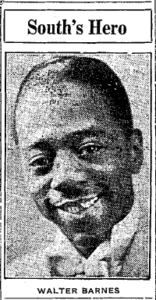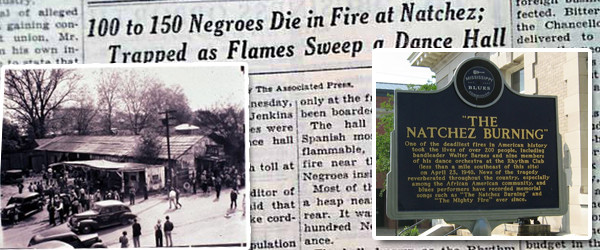On the night of April 23, 1940, the Walter Barnes Orchestra played as the Rhythm Club burned in Natchez, Mississippi. Spanish moss covered in a highly flammable insecticide had become ignited and large flames developed quickly. Entrances and windows had been boarded up to keep away the folks who wanted to hear Barnes’ music without paying for admission. But that left no way out. Barnes reportedly had his nine-piece band continue playing in an effort to calm the crowd. The fire would take the lives of 209 people that night including Barnes and several members of his band.

The disaster became a national story, making headlines coast to coast. The most thorough coverage was in the African-American newspaper, the Chicago Defender with whole sections of the paper devoted to the fire. Barnes had been a regular contributor to the Defender, updating the paper with short articles about his life on the road as a traveling band leader. The Defender reported he died as a hero for his efforts to calm the patrons.
It didn’t take long for song tributes to get recorded. The first were two sides from vocal group, The Lewis Bronzeville Five: Mississippi Fire Blues and Natchez Mississippi Blues, recorded just over two weeks after the disaster on May 9, 1940. Both songs are stories about the singer losing his girl to the flames. Pianist Leonard “Baby Doo” Caston recorded the The Death of Walter Barnes on June 4, 1940 featuring Robert Nighthawk on harmonica:
Now, it was just about midnight, just about twelve o’clockPoor Walter played his theme song, the dance floor began to rockLord and people were all dancing, enjoying their life so hardJust in a short while, the dance floor was full of fire
Lord, I know how you Natchez people feel todaySome of them are thinking of the fire that took their children’s lives away
Did you ever hear about the burning that happened way down in Natchez, Mississippi town?
Those buildings got to burning, there’s my baby laying on the ground
Charlotte Jones was there, Louisa was there
Rosa Mae was there, Louise was there
Did you ever hear about the burning that happened way down in Natchez Mississippi town?
I stood back, was looking, and the whole building come tumbling down
The whole band is in a restrained mode, allowing Wolf’s mournful singing to shine even more. The song does what the blues does best, communicates pain and allows it to be released. Wolf reminds us, the fire took the lives of real people that we should remember.
The Wolf wasn’t the only blues giant to sing about the fire, John Lee Hooker took it on the subject in 1957’s Natchez Fire (Burning). He gets some details of the song wrong (the year) but gets at the true horror of being burned alive better than anyone else:
Did you read about the fire?
Nineteen hundred and thirty-seven
Walter Barnes and his big band, they was swinging that night
The building had one door, it was on the sideThe fire broke out late that night, people was screaming
They couldn’t get out, everybody running, running to the door
The door got jammed, nobody got out
All you could hear, crying “Lord have mercy, mmmm, save me, save me, save me”
Between Howlin’ Wolf and John Lee Hooker, quite a few others were inspired to record cover versions or new interpretations of these songs. Most notably in recent years is Elmo Williams and Hezekiah Early’s Natchez Fire, a version of Wolf’s song released on Fat Possum’s Takes One to Know One in 1998. Today, seventy-one years after the incident, these songs help us a remember an incident that forever changed the community of Natchez and made an impact on the whole country.

